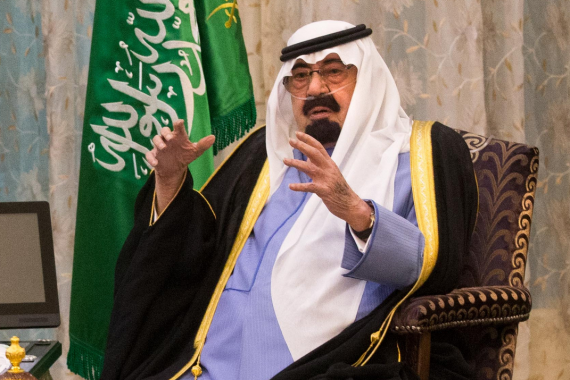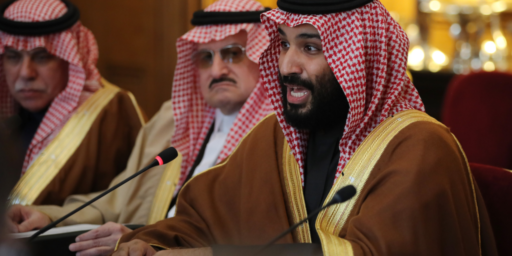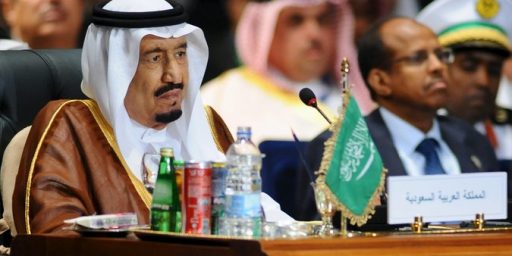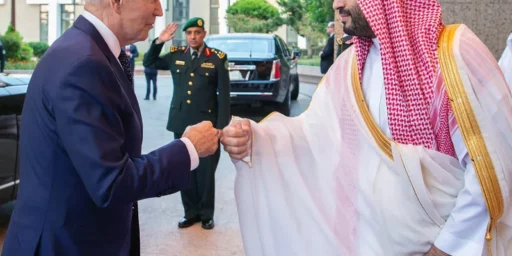King Abdullah Of Saudi Arabia Dies At 90, Crown Prince Salman Becomes King
A big change in an important nation in the most volatile part of the world.
Abdullah ibn Abdilazīz, who served from 2005 to today as the Sixth King of Saudi Arabia from 2005 until today, has died at the age of 90, and will be succeeded per tradition by his half-brother Crown Prince Salman:
King Abdullah of Saudi Arabia, who came to the throne in old age and earned a reputation as a cautious reformer even as the Arab Spring revolts toppled heads of state and Islamic State militants threatened the Muslim establishment that he represented, died on Friday, Saudi officials. He was 90.
The cause was unknown. He had been in a hospital since December and placed on a respirator.
Succession was swift. Abdullah’s brother and crown prince, Salman, in a statement attributed to him on Saudi state television, announced the king’s death and that he had assumed the throne.
The royal court, quoted by the official Saudi Press Agency, said the king had a lung infection when he was admitted on Dec. 31 to the Riyadh hospitalnamed for his father, Abdul Aziz, who through conquest and multiple marriages forged the desert kingdom in the years after the destruction of the Ottoman Empire.
Accidents of birth and geology made Abdullah one of the world’s wealthiest and most powerful men. In control of a fifth of the world’s known petroleum reserves, he traveled to medical appointments abroad in a fleet of jumbo jets, and the changes he wrought in Saudi society were fueled by gushers of oil money.
As king he also bore the title of custodian of Islam’s holiest mosques, in Mecca and Medina, making him one of the faith’s most important figures.
Abdullah had grown accustomed to wielding the levers of power long before his ascension to the throne in August 2005. After his predecessor, King Fahd, a half brother, had a stroke in November 1995, Abdullah, then the crown prince, ruled in the king’s name.
Yet Abdullah spoke as plainly as the Bedouin tribesmen with whom he had been sent to live in his youth. He refused to be called “your majesty” and discouraged commoners from kissing his hand. He shocked the 7,000 or so Saudi princes and princesses by cutting their allowances. He was described as ascetic, or as ascetic as someone in the habit of renting out entire hotels could be.
Abdullah’s reign was a constant effort to balance desert traditions with the demands of the modern world, making him appear at times to be shifting from one to the other.
When popular movements and insurgencies overthrew or threatened long-established Arab rulers from Tunisia to Yemen in 2011, he reacted swiftly.
On his return from three months of treatment for a herniated disk and a blood clot in New York and Morocco, his government spent $130 billion to build 500,000 units of low-income housing, to bolster the salaries of government employees and to ensure the loyalty of religious organizations.
He also created a Facebook page, where citizens were invited to present their grievances directly to him, although it was not known how many entries actually reached him.
But in at least two telephone calls he castigated President Obama for encouraging democracy in the Middle East, saying it was dangerous. And he showed no tolerance in his country for the sort of dissent unfolding elsewhere.
The grand mufti, the kingdom’s highest religious official, proclaimed that Islam forbade street protests. Scores of protesters who failed to heed that message were arrested in the chiefly Shiite eastern provinces. A new law imposed crippling fines for offenses, like threatening national security, that could be broadly interpreted.
Reaching beyond his borders, Abdullah sent tanks to help quell an uprising in neighboring Bahrain.
Still, Abdullah became, in some ways, a force of moderation. He contested Al Qaeda’s militant interpretations of the faith as justifying, even compelling, terrorist acts. He ordered that textbooks be purged of their most extreme language and sent 900 imams to re-education sessions. He had hundreds of militants arrested and some beheaded.
But he was also mindful that his family had, since the 18th century, derived its authority from an alliance with the strict Wahhabi sect of Sunni Islam. He accordingly made only modest changes to the kingdom’s conservative clerical establishment. When Islamic State forces conquered vast stretches of Syria and Iraq, imposing a creed linked to Saudi Arabia’s own, the kingdom was slow to respond.
On one occasion, however, Abdullah chastised senior clerics for not speaking out more forcibly against the jihadists, and he eventually sent Saudi pilots to participate in an American-led campaign against the Islamic State.
Abdullah’s Saudi Arabia had hurtled from tribal pastoralism to advanced capitalism in little more than a generation. The fundamentalist clerics who gave the family legitimacy remained a powerful force. Women who appeared in public without the required covering risked arrest or a beating from the religious police.
Abdullah did make changes that were seen as important in the Saudi context. He allowed women to work as supermarket cashiers and appointed a woman as a deputy minister. At the $12.5 billion research university he built and named for himself, women study beside men.
However, he did not fulfill a promise made to Barbara Walters of ABC News in his first televised interview as king in October 2005: that he would allow women to drive, a hugely contentious issue in Saudi Arabia.
Although he ordered the kingdom’s first elections for municipal councils in 2005, a promised second election, in October 2009, in which women would vote, was postponed until September 2011. Then in March of that year, the Ministry of Municipal and Rural Affairs announced that the question of women voting would be put off indefinitely “because of the kingdom’s social customs.”
Abdullah’s greatest legacy, however, may prove to be a scholarship program that sent tens of thousands of young Saudi men and women abroad to study at Western universities and colleges. It has been suggested that the changes long resisted by conservative forces — resistance that even a king could not overcome — would one day come about as those young men and women rose in the government, industry and academia.
Perhaps Abdullah’s most daunting challenge arrived in the wake of the Sept. 11, 2001, terrorist attacks, with the revelation that 15 of the 19 hijackers were Saudis. The royal family at first railed at what it called a vicious public relations campaign against the kingdom, then ruthlessly suppressed known militants — not least because the monarchy itself was a main target of Al Qaeda.
(…)
Abdullah bin Abdul Aziz al-Saud was born in Riyadh in 1924 into a vast, complicated family. His father, Abdul Aziz, had many as 22 wives.
Abdul Aziz, whose ancestors founded a precursor to the present Saudi state in 1744, chose his wives partly to secure alliances with other Arabian tribes. Abdullah’s mother, Fahda bint Asi al-Shuraim, was a daughter of the chief of the Shammar, whose influence extended into Syria, Iraq and Jordan.
Abdullah was Fahda’s only son. She also had two daughters.
King Abdul Aziz was not an indulgent father to his dozens of sons. He was quoted as saying, “I train my own children to walk barefoot, to rise two hours before dawn, to eat but little, to ride horses bareback.”
When the young Abdullah once neglected to offer his seat to a guest, Abdul Aziz sentenced him to three days in prison.
Abdullah, who overcame a stutter, was educated in religion, Arab literature and science by Islamic scholars at the royal court. From the Bedouin nomads, he learned traditional ways, including horsemanship and desert warfare. In 1962, he was appointed commander of the National Guard, which draws recruits from the Bedouin tribes, protects the king and acts as a counterweight to the army.
Four of Abdullah’s half brothers preceded him to the throne.
King Khalid appointed Abdullah as second deputy prime minister in 1975. In 1982, Fahd, Khalid’s successor, named him deputy prime minister and crown prince.
After Fahd’s stroke, Abdullah ran the government at first as regent. Political pressures later forced the removal of the regent title, but Abdullah remained the effective decision-maker until assuming the throne in 2005. He refused to sign any official papers with his own name as long as his stricken brother lived. Fahd died on Aug. 1, 2005.
One of King Abdullah’s first official acts was to pardon two Libyans accused of plotting to kill him, a result of Egypt’s engineering a reconciliation between the two nations. He also pardoned three Saudi academics who were in prison for urging the kingdom to adopt a constitutional monarchy
He went on to establish job-training programs to help ease severe unemployment among educated young Saudis, to develop long-wasted natural gas as a commodity that could be exported, and to bring Saudi Arabia into the World Trade Organization. He became the first Saudi head of state to meet a pope, Benedict XVI, in 2007.
Although he reaffirmed his kingdom’s longstanding alliance with the United States, tensions arose with events. Abdullah refused, for instance, to permit American bases on Saudi territory for the invasion of Iraq in 2003, something he had allowed in the first Gulf War.
The White House has released a statement on King Abdullah’s death:
t is with deep respect that I express my personal condolences and the sympathies of the American people to the family of King Abdullah bin Abdulaziz and to the people of Saudi Arabia.
King Abdullah’s life spanned from before the birth of modern Saudi Arabia through its emergence as a critical force within the global economy and a leader among Arab and Islamic nations. He took bold steps in advancing the Arab Peace Initiative, an endeavor that will outlive him as an enduring contribution to the search for peace in the region. At home, King Abdullah’s vision was dedicated to the education of his people and to greater engagement with the world.
As our countries worked together to confront many challenges, I always valued King Abdullah’s perspective and appreciated our genuine and warm friendship. As a leader, he was always candid and had the courage of his convictions. One of those convictions was his steadfast and passionate belief in the importance of the U.S.-Saudi relationship as a force for stability and security in the Middle East and beyond. The closeness and strength of the partnership between our two countries is part of King Abdullah’s legacy.
May God grant him peace.
Given the importance of Saudi Arabia to the region and the world, the death of its leader is obviously a significant event. Pursuant to long-standard tradition, there is no real doubt about how it will play out, although the transition may not be as smooth as some in the past both because of the nature of the international situation at the moment and because it puts the Kingdom one step closer to the day when the generation composed of ibn Saud’s grandchildren will begin to assume power:
Saudi Arabia’s King Abdullah bin Adbul Aziz died Thursday evening, setting the stage for a transition of power at a critical moment as the key U.S. ally in the Middle East struggles with falling oil prices and rising Islamist violence.
The monarch, who was most likely 90, was succeeded by his brother, Crown Prince Salman, according to state television. That put the region’s most important Sunni power and America’s closest Arab ally in the hands of a 79-year old who is reportedly in poor health and suffering from dementia.
Salman’s rise to the throne postpones the question of when the Saudi monarchy will turn to the next generation of princes to run their country of 28 million people at a crucial moment in a region mired in crisis.
While observers in Riyadh widely predicted a smooth transition to Salman, his poor health means his rule could be relatively short. Should there be a power struggle to succeed him, it could leave a policy vacuum in the Middle East at a critical time. Saudi Arabia is a key member of the U.S.-led coalition against the Islamic State and a major ally of the collapsed government in neighboring Yemen.
“Having a king with dementia is the last thing they need at this difficult time,” Henderson said. “Yemen is falling apart, ISIS is knocking at the door … this is an extraordinarily dangerous Middle East from a Saudi perspective.”
By Saudi tradition, the crown passes down among the sons of national founder King Adbulaziz bin Saud, who died in 1953. Salman would be the sixth son of Abdulaziz to be king, and few of his remaining brothers — out of at least 35 who were alive when Abdulaziz died — are believed to be healthy or qualified enough to assume the throne.
In an apparent bid to preempt quarrels about succession in the royal family – and also secure the line for his own favored branch of the family — Abdullah last year took the unprecedented step of anointing a deputy heir, Prince Muqrin, 71, his youngest brother, in a move that analysts believed was a sign of Abdullah’s concern over Salman’s health.
Muqrin is said to be smart and is well-liked among ordinary Saudis; he also has good ties with Saudi Arabia’s most important ally, the United States. But the choice sparked fierce opposition from some of the many excluded princes, who complained that Abdullah was defying a tradition that allows each king to name his own heir. Additionally, Muqrin’s mother was a Yemeni concubine, not a Saudi princess, and some in the family reportedly consider his lineage too impure for him to wear the crown.
By Saudi tradition, King Salman would be free to choose his own successor-in-waiting, but it is widely believed here that he would simply elevate Muqrin from deputy to crown prince.
At that point, the Saudi royal family would face a far more complicated puzzle about who would succeed Muqrin, but it would almost certainly be a prince from the next generation, the grandchildren of Abdulaziz. Hundreds of princes belong to that generation of the House of Saud.
At least initially, there doesn’t seem to be any doubt about succession. The Royal Court has named Salman as the new King and he has assumed that role, but that may not be the end of it. If Salman proves not to be up to the task, then things may get a little complicated:
Henderson said there could be far more maneuvering than the royal family will admit. He said some would privately argue that Salman is not of sound enough mind to run the country, and other factions within the family would push their own favorites.
“The trick is always to try and understand their logic and not be too confined by our own logic,” he said. “Their logic is different. They hate the idea of public show of disunity. So they’ll try to cover that up completely.”
Henderson said “Western logic” would suggest that the Saudis would be smarter to pass over Salman in favor of Muqrin or a next-generation king who would be have the health and faculties to lead the country at an increasingly complex and violent time. Saudi borders a part of Iraq where the Islamic State is powerful, and its southern neighbor, Yemen, is in the midst of a power struggle that Saudis believe will strengthen Iran, its regional rival.
How this succession proceeds will be hugely important to watch over the coming days, weeks, and months. At the very least, it’s worth paying attention to.






Salman is known to have a number of health problems, at the very least spine problems that have resulted in his losing the use of one hand. The “sound enough mind” mentioned in the article is presumably the speculations that he suffers from some form of dementia, possibly Alzheimers.
I’m hoping that our colleague John Burgess will make some remarks since I suspect he’s personally acquainted with some of the personalities. He may be too discreet.
Is this man related to that Prince Feisal in “Lawrence of Arabia” ?
When I saw the news reports this evening I almost expected to see General Allenby and General Lawrence sitting there with him.
Time to watch the movie again.
The likely scenario is continued, stable oppression. That’s also probably the best-case scenario geopolitically. It’s impossible to comprehend just how wealthy they are; a few years of lower oil prices would mean nothing to them. That kind of money can buy stability…until the day it all of a sudden can’t. If they’d inch toward a Western conception of rights, then maybe that sudden day would lead to positive reform. Any bets? Keep in mind that no one’s gone broke betting on worst-case scenarios in the Middle East.
Saudi Arabia 2015 is our Russia 1943. It’s an awful regime. An evil regime. But I suppose the enemy of my enemy is my friend. Sad as it may seem, we need stability there. The local alternatives to monarchy aren’t usually an improvement.
” That put the region’s most important Sunni power and America’s closest Arab ally in the hands of a 79-year old who is reportedly in poor health and suffering from dementia.”
Hey, we survived Reagan…
@Tyrell: “Time to watch the movie again.”
It is indeed a great movie. But when using it as a guide to current events, as you seem to do, it’s best to keep in mind that it’s a 50 year old movie based on 100 year old events.
@Tyrell:
Simply, no.
Long term I’m betting on the Husseins in the Arab world (not just Muslim, Indonesians don’t care much).
The Royal Family of Jordan is the direct descendent of the warlord Mohammed, founder of the Islam faith, and controlled Mecca until the Saudi family took it over ~ 100 years ago. That matters to the Arabs.
[I’ll certainly listen to what Dave Schuler has to say on this] and xrabia
There is a lot of speculation about Salman’s mental health, but I don’t have anything solid on it. I haven’t seen or spoken with him in better than 10 years.
He is more conservative than Abdullah, but he has strong religious credentials of his own — as did Abdullah — so he’s not going to get rolled by the clerics, as was Fahd.
There’s already been a house-cleaning in the Royal Court (the innermost advisors), but nothing yet to signal any change in policies.
If Salman turns out to be deficient, there’re a couple of courses the country could take. They could just leave him as figurehead, with the Crown Prince doing the heavy lifting. There’s precedent for that. Or they could have him step down. I suppose a third alternative could be internecine war within the family, but as that was the principle cause the the fall of the Second Saudi State in the 1800s, I think the family would prefer to avoid that.
Damn…just when gas prices were getting almost reasonable again.
@C. Clavin: After a little $1/bbl bump, they’re still on their way down.
Thank you, John. That’s very helpful.
For those of you who aren’t aware of it John Burgess was a career diplomat stationed in Saudi Arabia. He now blogs at Crossroads Arabia and posts here, too, from time to time. He’s fluent in Arabic and, well, has been around the block.
@Dave Schuler: I no longer claim fluency in Arabic. It’s been ten years since I was using it daily.
Will Obama take credit for this too?
@Jack: Are you suggesting Obama would claim credit for Abdullah dying? That seems a tasteless thing to suggest.
There may be negative fallout from this. If so, I am sure you’ll blame Obama.
@Jack:
It’s stuff like this where you have to wade thought the comments of obsessive, untethered from reality BS that poisons the well for rational and sober debate in this country. The sadder part of it there is a ready chorus of people who outsources their thinking to these uninformed, outspoken nabobs of nihilism ready to bob their heads in agreement as if they were actually making a relevant point.
@wr:
It’s stuff like this where you have to wade thought the comments of obsessive, untethered from reality BS that poisons the well for rational and sober debate in this country. The sadder part of it there is a ready chorus of people who outsources their thinking to these uninformed, outspoken nabobs of nihilism ready to bob their heads in agreement as if they were actually making a relevant point.
@Pinky: It’s far from clear to me what exactly @Jack: was trying to say, but it seemed to be that Obama would see the death of Abdullah as a good thing, and suggesting that Obama would publicly claim “credit” for killing a foreign head of state. @wr: was playing off the fact that Reagan was diagnosed with Alzheimer’s after leaving office, leaving widespread speculation it had started to affect him earlier. You see no difference?
Also, wr’s crack was funny, a virtue that redeems other flaws. It’s why Mel Brooks gets to use the N word and you don’t.
Seems worthwhile to remember that Saudi Arabia is a front-line anti-Daech state and that al-Baghdadi’s forces have killed Gen Oudah al-Belawi, their commander on their northern border. One wonders how long a single family business can appropriate for itself both the world’s most amazing oil reserves and the holiest sites in Islam. It’s a cliche but should be foremost in our minds what a dangerous neighborhood they live in. globalguerrillas.typepad.com/globalguerrillas/2015/01/saudi-arabia-on-the-edge-of-an-abyss.html
We’re probably going to see something somewhat like what happened in Japan, where the Emperor was a figurehead and all the political power maneuvering happened behind the scenes.
Abdullah was a vicious old tyrant, a torturer of dissidents and beheader of women. He sent his mercenary army to put down revolt against the tyrant rulers of Bahrain, aided anti-democratic forces across the region in countering the Arab Spring, and, thanks to Chelsea Manning, we know he was demanding the U.S. start a war with Iran.
Oh yes, he also devoted considerable resources to exporting the most violent interpretations of Islam to the four corners of the Earth, giving us such lovely presents as ISIS.
By all means, let us white-wash him into a man of “peace.” Otherwise his successors won’t sell us oil or buy our weapons.
@Ben Wolf: I think it’s more a case of “if the Royal Family were NOT in charge of Saudi Arabia what would be happening?”
Sometimes it really is a lesser of the two evils case.
Meanwhile John Boehner is conspiring with a foreign head of state to drag us into a new and likely far worse war in the middle east. It could be the plot for a paperback thriller – Speaker of the House committing treason. Sadly it’s reality.
I’d love to hear what James Joyner has to say about this. War with Iran – against the policy of the president, against the wishes of the American people, against the wishes of our allies, serving only the interests of Likud and the GOP.